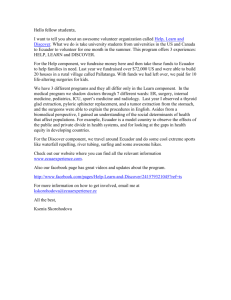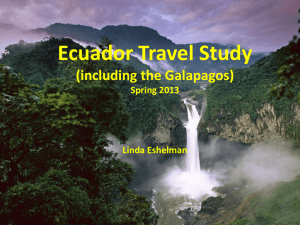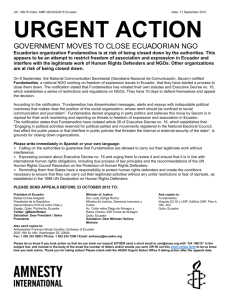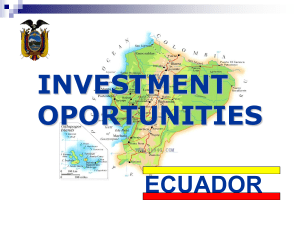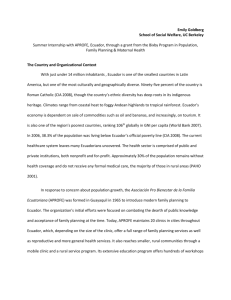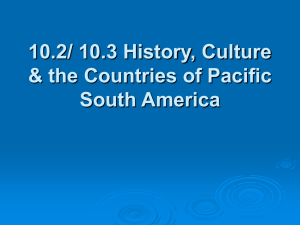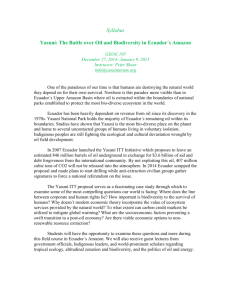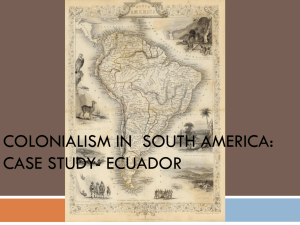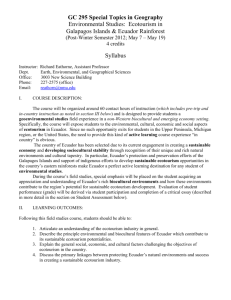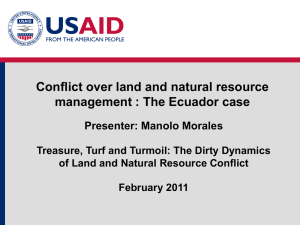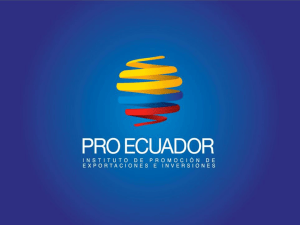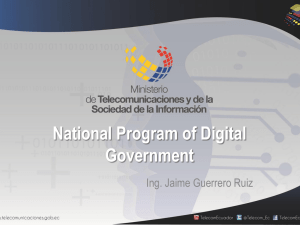Cross Cultural Studies: Cheltenham, England
advertisement
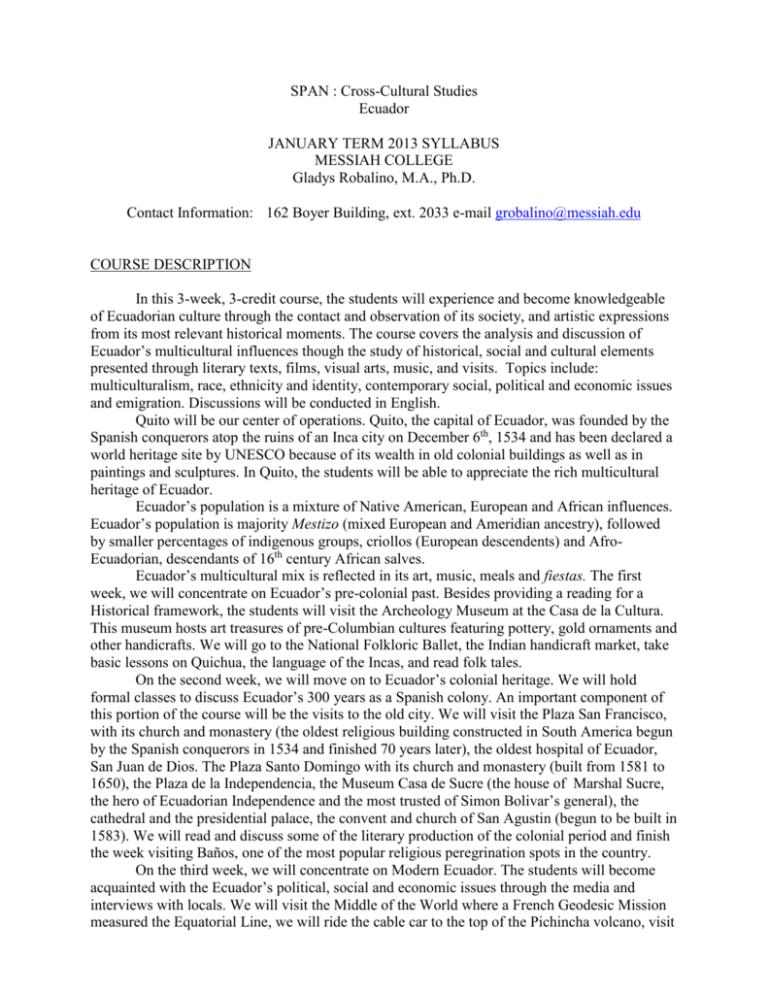
SPAN : Cross-Cultural Studies Ecuador JANUARY TERM 2013 SYLLABUS MESSIAH COLLEGE Gladys Robalino, M.A., Ph.D. Contact Information: 162 Boyer Building, ext. 2033 e-mail grobalino@messiah.edu COURSE DESCRIPTION In this 3-week, 3-credit course, the students will experience and become knowledgeable of Ecuadorian culture through the contact and observation of its society, and artistic expressions from its most relevant historical moments. The course covers the analysis and discussion of Ecuador’s multicultural influences though the study of historical, social and cultural elements presented through literary texts, films, visual arts, music, and visits. Topics include: multiculturalism, race, ethnicity and identity, contemporary social, political and economic issues and emigration. Discussions will be conducted in English. Quito will be our center of operations. Quito, the capital of Ecuador, was founded by the Spanish conquerors atop the ruins of an Inca city on December 6th, 1534 and has been declared a world heritage site by UNESCO because of its wealth in old colonial buildings as well as in paintings and sculptures. In Quito, the students will be able to appreciate the rich multicultural heritage of Ecuador. Ecuador’s population is a mixture of Native American, European and African influences. Ecuador’s population is majority Mestizo (mixed European and Ameridian ancestry), followed by smaller percentages of indigenous groups, criollos (European descendents) and AfroEcuadorian, descendants of 16th century African salves. Ecuador’s multicultural mix is reflected in its art, music, meals and fiestas. The first week, we will concentrate on Ecuador’s pre-colonial past. Besides providing a reading for a Historical framework, the students will visit the Archeology Museum at the Casa de la Cultura. This museum hosts art treasures of pre-Columbian cultures featuring pottery, gold ornaments and other handicrafts. We will go to the National Folkloric Ballet, the Indian handicraft market, take basic lessons on Quichua, the language of the Incas, and read folk tales. On the second week, we will move on to Ecuador’s colonial heritage. We will hold formal classes to discuss Ecuador’s 300 years as a Spanish colony. An important component of this portion of the course will be the visits to the old city. We will visit the Plaza San Francisco, with its church and monastery (the oldest religious building constructed in South America begun by the Spanish conquerors in 1534 and finished 70 years later), the oldest hospital of Ecuador, San Juan de Dios. The Plaza Santo Domingo with its church and monastery (built from 1581 to 1650), the Plaza de la Independencia, the Museum Casa de Sucre (the house of Marshal Sucre, the hero of Ecuadorian Independence and the most trusted of Simon Bolivar’s general), the cathedral and the presidential palace, the convent and church of San Agustin (begun to be built in 1583). We will read and discuss some of the literary production of the colonial period and finish the week visiting Baños, one of the most popular religious peregrination spots in the country. On the third week, we will concentrate on Modern Ecuador. The students will become acquainted with the Ecuador’s political, social and economic issues through the media and interviews with locals. We will visit the Middle of the World where a French Geodesic Mission measured the Equatorial Line, we will ride the cable car to the top of the Pichincha volcano, visit the Museum of Man started by Oswaldo Guayasamin one of the most important painters in the country, the open markets and street festivals. Final trip TBA. COURSE OBJECTIVES This course will help the students: a. Understand the interdependence of world systems and the ways global inequality affects quality of life and life chances for people in the world. During the course, the students will have opportunity to learn about and come in contact with the two largest ethnic groups that constitute the Ecuadorian society: Amerindians and Mestizos (a mix of European and Amerindian). Not only will they have to reflect on the tensions and social conflicts within the country, but also bring that reflection into a broader worldly location of the Amerindian culture and how global economy and politics affect their existence. b. Develop increased understanding and appreciation for cultural traditions significantly different from their own and become aware of how people from different cultures perceive the world, interpret reality, and make meaning. During the course, the students will learn about the history and culture of Amerindian groups in Ecuador and how their culture manages to survive and coexist with the culture brought by the Spanish colonizers. The students are expected to observe and reflect upon different cultural traditions as expressions of unique perceptions of the world. c. Understand the paradoxes, tensions, and contradictions as well as the consistencies and values in a society significantly different from their own. Through the students’ interaction with locals and the discussions carried out in the classroom, the students are expected to show a deep understanding of the local cultural values. The students are also expected to develop the ability to contrast with a critical mind their own culture and values with the ones encountered. d. Develop an appropriate sense of cultural relativism and reduce ethnocentrism. The students are expected to understand the country’s cultural values and appreciate cultural differences through significant interaction with local people and participation in religious and secular festivities as well as community and familiar activities. e. Reflect on their culture and society from the perspective of another culture. The students are expected to reflect and discuss their own culture and society from the perspective of the host country’s. Though the students are expected to develop their own opinion of the Ecuadorian culture, the leader, Gladys Robalino as an Ecuadorian herself, will often act as a cultural interpreter. f. Gain skill and experience living and working in a culture different from their own. The students will live with host local families during the three weeks of the course and will interact with other locals through visits, discussions and lectures. COURSE REQUIREMENTS Required reading Handelsman, Michael H. Culture and Customs of Ecuador. Culture and customs of Latin America and the Caribbean. Westport, Conn: Greenwood Press, 2000. Reference readings Greenleaf, Richard E. The Roman Catholic Church in Colonial Latin America. New York: Knopf, 1971. Roos, Wilma, and Omer van Renterghem. Ecuador: A Guide to the People, Politics, and Culture. London: Latin America Bureau, 1997. MacQuarrie, Kim. The Last Days of the Incas. New York: Simon & Schuster, 2007. García R., Edgar Allan, and Rebecca Millhouse. 3 Magical Legends from Ecuador. Ecuador: Editorial El Conejo, 2004. Toaquiza, Alfonso. The condor who fell in love : a Quichua legend. Cotopaxi, Ecuador: A. Toaquiza, 2006. Films TBA Discussion/Participation/Service Students are expected to participate in all group activities including site visits, seminars, service projects, and so on. Students should plan to contribute to group discussion sessions regarding observations and readings. It is also expected that students will exhibit sensitive, helpful, and courteous behavior to all persons with whom they come in contact. Homestays During our time in Quito, each student will be placed with a family for a period of 10-12 days. Students will be taking an hour a day of language instruction at ACLAS (Andean Center for Latin American Studies) and they will be expected to interact with the members of the family to the extent that they are able en español. Data from participant observation and/or interviewing will be recorded in journals and can be incorporated into the Project. Journal An important component of this course is journaling and personal reflection on one’s experience. Students should keep a daily journal in which they highlight key activities of the day, delineate unique observations, and reflect upon insights gained. Students should also pay particular attention to one aspect of the local culture (i.e., family relationships, education, food, business, healthcare, festivals, children’s play) about which they will write a six to eight-page participant observation paper. Notes from observations and interview with people on the specific topic should also be offset and maintained in the journal. Journals should be typed Final Paper Each student will interact with local individuals and families in an effort to study the cultural way of life more intently. Considerable personal interaction is expected during the entire trip, as students participate in day stays and take part in the lives of local people in their homes, work places, and communities. Students will spend a minimum of fifty intimate contact hours with their local hosts in all of the setting in which the persons and families normally interact. Data from participate observation and interviewing will be recorded in journals, analyzed, and organized into a five page paper comparing the cultural similarities and diversities among the various locals and the North American culture. ASSESSMENT/EVALUATION Students’ grades will be based on the following: 40% - Participation 30% - Journal 30% - Final paper TENTATIVE SCHEDULE Week 1: Indigenous Ecuador 9:00 – 10:15 10:30 – 11:45 3:00 – 6:00 Monday Language Tuesday Language Wednesday Thursday Language Language Friday Language Saturday Cultural discussion Cultural discussion Cultural discussion Cultural discussion Cultural discussion Otavalo Quichua lesson Volunteer work Volunteer work Visit National Casa de la Folkloric Cultura Ballet Ecuatoriana Readings: Sunday History of pre-Inca and Inca cultures (selections) Folk tales: 3 Magical Legends from Ecuador, The condor Who Fell In Love. Cultural visits: Casa de la Cultura Ecuatoriana Museum Special events: Quichua lessons, National Folkloric Ballet Volunteer work: places TBA Out of town trip: The Indian Market in Otavalo (Otavalo tribe with a strong Inca heritage) Week 2: Colonial Ecuador 9:00 – 10:15 10:30 – 11:45 3:00 – 6:00 Readings: Monday Language Tuesday Language Wednesday Thursday Language Language Friday Cultural discussion Visit Old city Cultural discussion Visit Old city Cultural discussion Visit Old city Baños Cultural discussion Volunteer work Saturday Sunday History of conquest and colonization (selections) Juan Rodriguez Freile’s El carnero (1638) Eugenio Espejo’s El retrato de Golilla (1781) Cultural visits: A visit to the colonial city: architecture and visual arts (the baroque and rococo) Special events: Documentary: “Mercedes de Jesús” Volunteer work: places TBA Out of town trip: Baños Week 3: Modern Ecuador 9:00 – 10:15 10:30 – 11:45 3:00 – 6:00 Readings: Monday Language Tuesday Language Wednesday Thursday Language Cultural discussion Visit Museo del Hombre Cultural discussion Visit Street market Cultural discussion Visit Pichincha (mountain top view) Friday Saturday TBA News (Economy and politics) Cultural visits: Museo del Hombre: The Art of Oswaldo Guayasamin Special task/event: Out on the street: Ecuadorians and the American dollar (report) Salsa lessons Volunteer work: places TBA Out of town trip: TBA TENTATIVE COSTS Sunday (See attached budget) Payment Schedule – Payments are handled by the college Business Office and should be deposited into Cross-Cultural Account #______________. The first deposit of $200 is due September 15, the second on October 15. Refund Policy – Because payments on your behalf are typically made months in advance to travel agencies, airline companies, and assorted accommodations, many payments are nonrefundable. Therefore, if you withdraw from participation in the trip for any reason or are removed from participation by the College, you will forfeit whatever monies cannot be recovered, plus a $100 handling fee. The exact amount of recovered monies can generally not be established until the trip has been completed. SPECIAL NOTES Passports – You must have a valid passport. Luggage – You are limited to two pieces of checked luggage and one carry on. Most airlines have a carry-on weight limit of 40 pounds and a checked baggage weight limit of 70 pounds. (I would include this in the syllabus. The travel company or airline will give you this later, and you can pass this info along to students then.) Shots – Be sure your tetanus shot is current. (I would have a statement perhaps about the students going to the CDC and State Dept. web sites to determine what is required or recommended) Medical Information Form – Be sure to return your Medical Information Form by __________________________. You will need to also submit your insurance information in the event you need emergency medical attention. You should carry your insurance card if you have one. Telephones – Remind your significant others that telephones may be few and far between, so you won’t be calling often. Medication – All medication, both over-the-counter and prescribed, should be in its properly labeled container. Student Conduct – Messiah College Standards for Student Conduct, as outlined in the Community Covenant and Student Handbook, apply to cross-cultural courses. Should it become necessary to send a student home early because of behavioral problems, the additional expense will be paid by the student being expelled from the class. Students are also required to sign a study abroad contract which outlines expectations on behavior and conduct. Information for Students with Disabilities who may Require Accommodation - Messiah College makes reasonable accommodations for students with disabilities who are otherwise qualified to participate in its activities and programs. However, the Americans with Disabilities Act does not govern accessibility standards in other countries. The College does not discriminate on the basis of disability in admissions for study abroad programs, but is not responsible for assuring accessibility in international locations and cannot guarantee that accommodation will be available. While the College will try to arrange accommodation for special needs, students with disabilities must understand that some international experiences may not be appropriate for them. In order to address this concern, College policy requires students with special needs who require accommodation to self-identify at the time of application for participation in an international experience. These students must notify the Disability Services office of their interest in participating in an international experience and of their need for accommodation. The Director of Disability Services will meet with the student and sponsoring faculty member to determine whether the student's needs can be accommodated. Alcohol Policy - Messiah College prohibits the manufacture, possession, use, or distribution of illegal drugs and alcohol by all students. It is expected that while students are enrolled in course work (including breaks during the academic year (e.g., Christmas break, Spring Break)) they will not use alcohol or illegal drugs both on and off campus. If you have questions concerning the alcohol policy and/or its application to certain situations, you are encouraged to contact the Office of Community Development in Eisenhower 204, (717) 796-5239. Violation of this policy may result in sanctions ranging from a letter of reprimand to expulsion. I would state that students who break this policy will be sent home. Insurance Policy - The current international travel assistance insurance for which students and faculty pay when they travel abroad specifically excludes liability (i.e. refuses to pay) for losses occurring as a result of certain ultra-hazardous activities. These activities include motorcycle driving, scuba diving, skiing, mountain climbing, sky diving, professional or amateur racing, and piloting an aircraft. The insurance is not intended to cover these activities or others of the like (bungee jumping, flying in private aircraft, etc.). Faculty is not to include such activities in course curriculum or to otherwise authorize students to participate in them.
